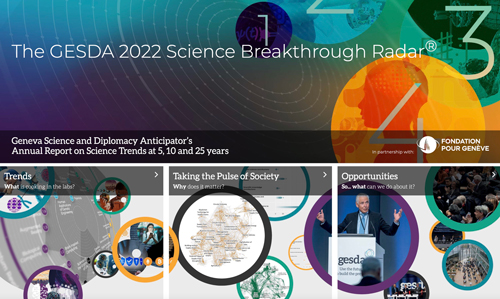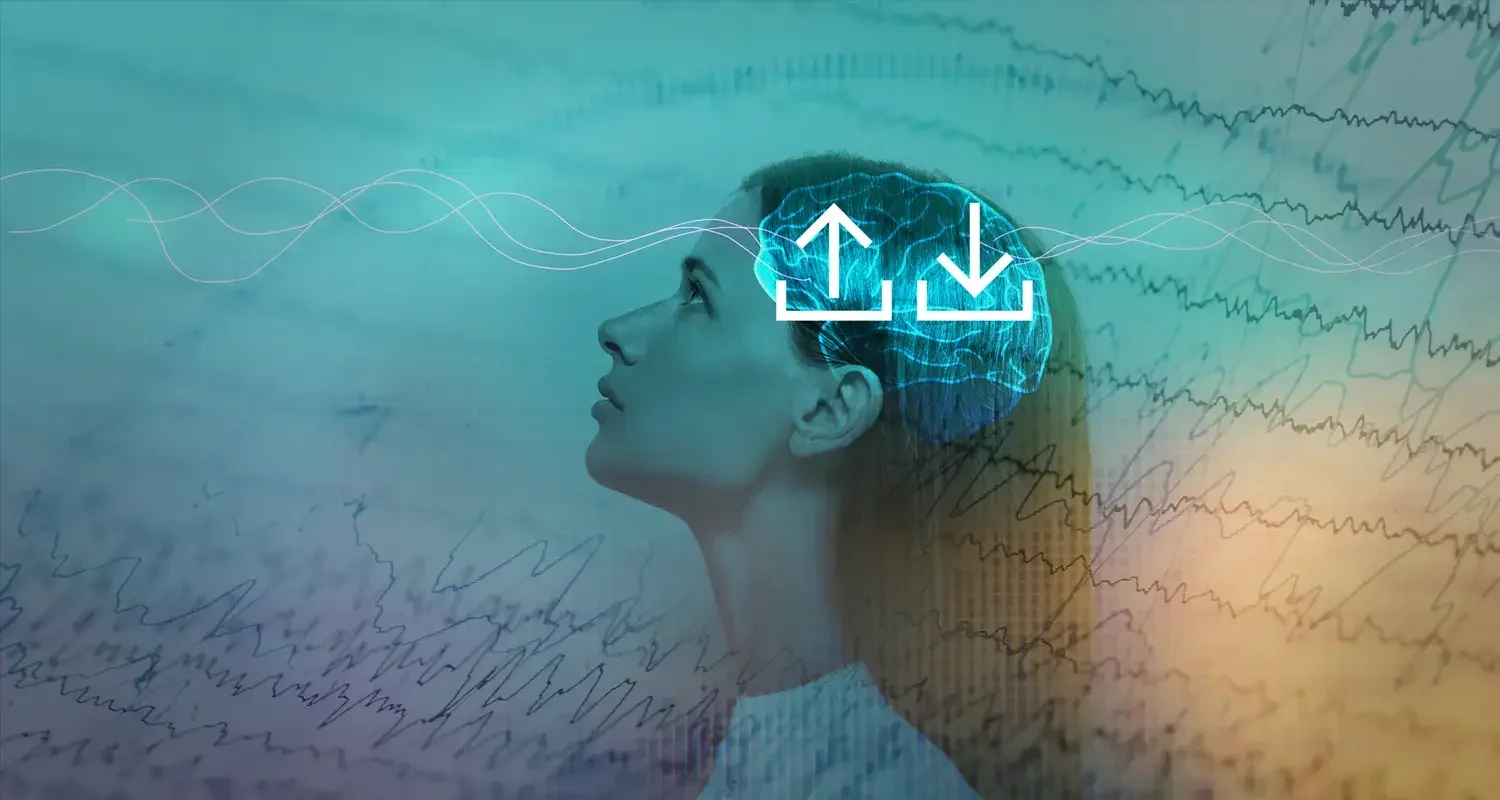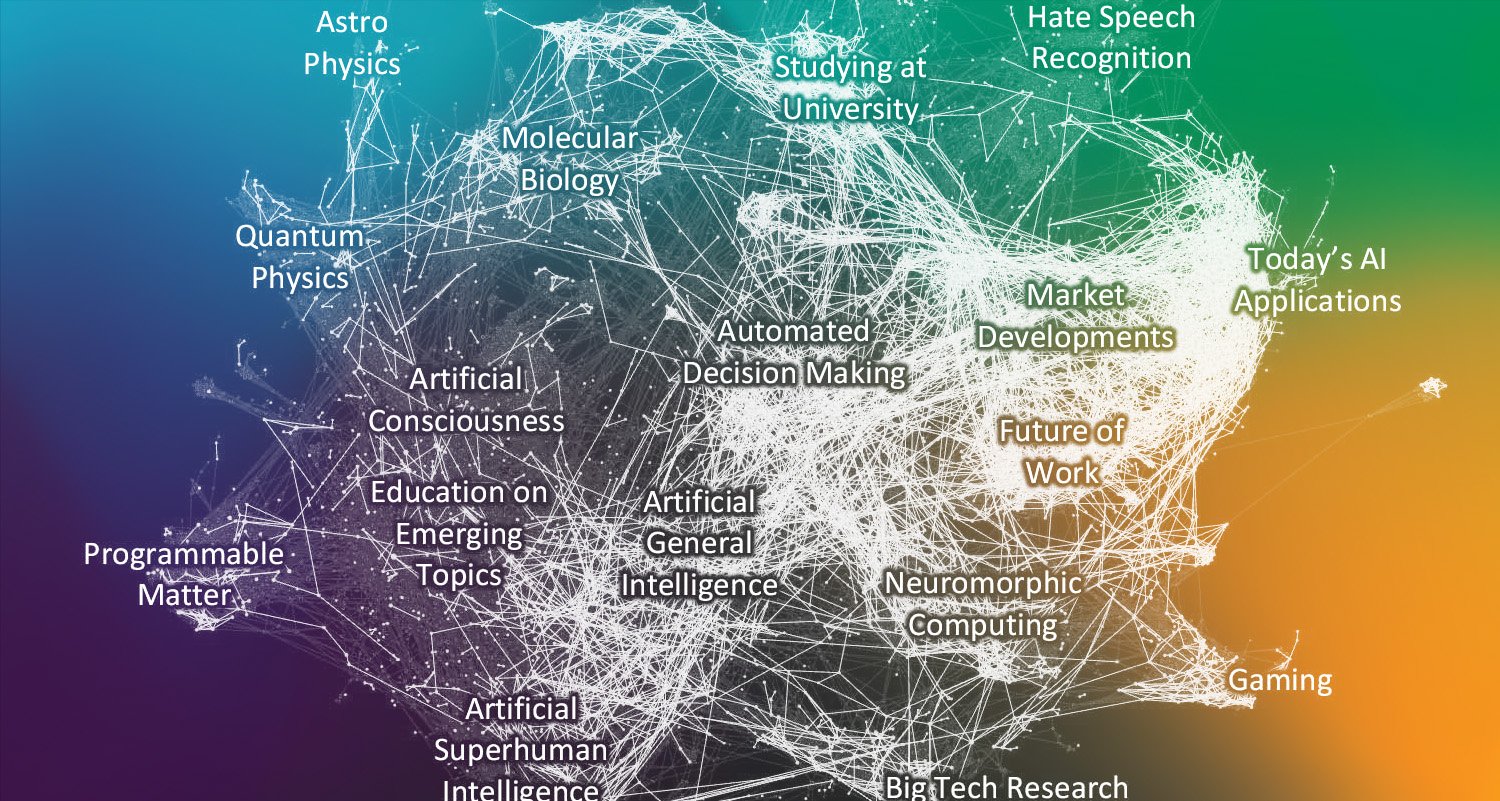Going beyond the views of experts and subject specialists, in the Actions and Debates section we have also analysed public discourse and its evolution in both mainstream and social media, using AI to identify and process millions of media articles to bring a significant update of the Pulse of Society to the Radar in 2023.
And as a highlight in the Opportunities section, we have included in this year’s Radar the exclusive presentation of the incubation report of GESDA’s most mature solution idea, the Open Quantum Institute.
In-depth scientific deep dive on neuro-augmentation: 2023 Villars High Level Anticipation Workshop on Neuro-augmentation
Recent advances in fundamental neurosciences, neurotechnologies and brain-inspired computing have been staggering and are likely to accelerate in the years to come, opening the door to new interventions to cure neuro-degenerative diseases or augment our cognitive capacities.
For example, brain-monitoring devices, brain-machine interfaces, and other ways of reading and writing the electrical signals of the nervous system are on the cusp of wide adoption across society. Their ubiquity could change everything from workplace rights to what it means to be human. In parallel, advances in brain organoids, interspecies chimeras and work on genetically modified primates are encroaching on established ethical boundaries. Finally, it is conceivable that applying fundamental knowledge about how the human brain works to computing devices and robotics could one day lead to the emergence of new forms of consciousness.
At the inaugural GESDA Villars high-level Anticipation Workshop, leaders from across different relevant disciplines met to discuss issues pertinent to the future of “neuro-augmentation”. The participants outlined the current status of the science of neuro-augmentation and identified areas of immediate, mid-term and long-term impact and concern, and how this should drive the focus of diplomatic and ethics intervention. Topics discussed include the state of the art methods by which machines can read and write to the human brain today, as well as where these methods may take the field in the future; hybrid brain development based on human and animal tissues; the hardware and software of artificial cognition today and what this may look like in the future; ethical considerations for ourselves and other entities, and our ethical imperative to anticipate responsibly when it comes to research into neuro-augmentation technologies.
The three GESDA lenses:
- GESDA Philosophical Lens: Deep Dive on The Future of People, Society & the Planet(s)
A panel of leading philosophers, convened by GESDA, developed and contributed their perspective on how the advances anticipated in the Radar will transform who we are as humans, how we live together as societies, and how we relate to the planet. For example, the possible development of conscious machines requires us to reflect on our purported uniqueness of being human, and which properties we may wish to actively preserve as the sole remit of human beings. Likewise, emerging digital technologies have the potential to directly target basic human social structures and practices at a fundamental level, from notions such as responsibility, trust, security, friendship and privacy through to democracy, justice and citizenship. Understanding how technology can instead be deployed to reduce inequality, improve well-being and foster inclusive development is a key challenge. Additionally, a key challenge posed by climate engineering technologies will be to consider the limits of how we perceive nature as a resource under our control in the context of anthropogenic environmental disruption. This work endeavours to bring in fundamental considerations on the future of humanity in order to open the space for solutions and alternative choices.
- GESDA Geopolitical Lens: Deep Dive on The Future of Peace and War:
Often resulting in violence or conflict, increasing tensions between countries and power blocks are often aggravated by climate change and competition in the field of digital technologies. Anticipation and foresight informed by an understanding of science and technology is therefore essential in the field of peace and war. Anticipation makes possible the creation and implementation of appropriate programmes and strategies to prevent or contain conflict, and to advance the more promising approaches to peace. Applying GESDA’s anticipatory methodology to mapping the future of peace and war involves plotting social and political scientists’ anticipations of the future. Unlike anticipating breakthroughs or new applications in the field of technology, foresight in the fields of social and political sciences entails more fragile projections with greater uncertainty, unanticipated tipping points and black swan events. In a series of two high-level workshops held in Geneva and New York in 2023, the three convening organisations — GESDA, the Geneva Centre for Security Policy (GCSP) and the School of International and Public Affairs (SIPA) at Columbia University — brought together experts in the field of peace and war to develop and apply a methodology to anticipate how advances in science and technology will influence the distribution of power in the next 10 to 25 years.
- GESDA Science Lens: Deep Dive on The Human Right to Science:
Article 27 of the Universal Declaration of Human Rights mentions the participation and the right to benefit from science. Article 15 of the International Covenant on Economic, Social and Cultural Rights places obligations on governments to encourage, facilitate and not to interfere with an individual’s work as a scientist, except as demanded by ethical and legal standards. Often overlooked, the right to science advocates for the responsible development and use of scientific progress and its applications. The right to science is therefore a crucial tool for anticipating both the benefits and the harms of scientific progress and its application. The Brocher Expert Workshop on the Human Right to Science with a Focus on Health was convened by GESDA in 2023. In the resulting report, 29 leading scholars and experts from the fields of international and humanitarian law discuss how incorporating a human rights framework into the scientific process provides an opportunity for a collaborative, holistic, and inclusive approach that goes beyond the mere mitigation of risks and enables the responsible exploration of the opportunities offered by scientific and technological progress.
GESDA Digital Pulse of Society: Deep Dive on people's expectations about science throughout the world
Current and future breakthroughs in science and technology are already affecting how we see ourselves as human beings, the way we interact with each other and our relation to the planet, capturing the interest of a broad swathe of society. Understanding public sentiment towards current and future breakthroughs in science and technology is therefore crucial for understanding society’s concerns for the future. Using Artificial Intelligence to analyse both mainstream media outlets and online social media platforms, we have provided an in-depth analysis of how much each of the topics in the Radar are most talked about, how these topics link to conversations about other themes within and outside of the Radar, and how sentiment is changing towards these topics over time, for different geographies and demographics. Finally, we use our monitoring tool to discover what actions civil society is taking with relation to their concerns and interests about each topic, highlighting significant initiatives and actors that have emerged over the last year. This year, for the first time, we have also captured how society’s opinions, sentiment and actions have evolved since the Radar’s first release.
GESDA Pulse of Diplomacy: Deep Dive on The Opportunities of Quantum & Advanced AI
In 2023, the rapid incorporation of Artificial Intelligence (AI) and advanced computing technologies into our everyday lives has been extraordinary. In this 2023 edition of the Science Breakthrough Radar, we have renewed our anticipatory briefing on Advanced AI, and added a brand-new brief on Unconventional Computing to describe advances in alternative computing technologies which are likely to one day surpass the capabilities of current state-of-the-art AI. Alongside these briefs, two new invited contributions detail how AI is changing how we think about the past, and how neuromorphic computing has the potential to develop robots with true ‘embodied’ intelligence. But GESDA was not created to be solely a think-tank: it is also a “do-tank”. Starting from the robust scientifically vetted knowledge captured in the Radar, GESDA is committed to ideate and design solution ideas for effective multilateralism with its science diplomacy community, enabling it to act in anticipation of scientific breakthroughs. The Open Quantum Institute (OQI) is the first initiative to be incubated by GESDA. This exclusive report details the development of the OQI from the scientific anticipation of quantum technologies to its inception as a validated solution idea for science diplomacy, first announced at the GESDA Summit 2022. It includes details on establishing the OQI as the “go-to” place for SDG applications of quantum computing, how it works with its partners to provide more inclusive access to quantum computers, how vital educational and training plans will be associated with the institute, and a proposal for shaping a multilateral governance enabling quantum computing to be leveraged for the SDGs. In addition, we describe how the engagement of a supportive community of stakeholders will co-create the OQI’s unique value proposition, securing its value for a society where quantum technologies work for all, not the few.







